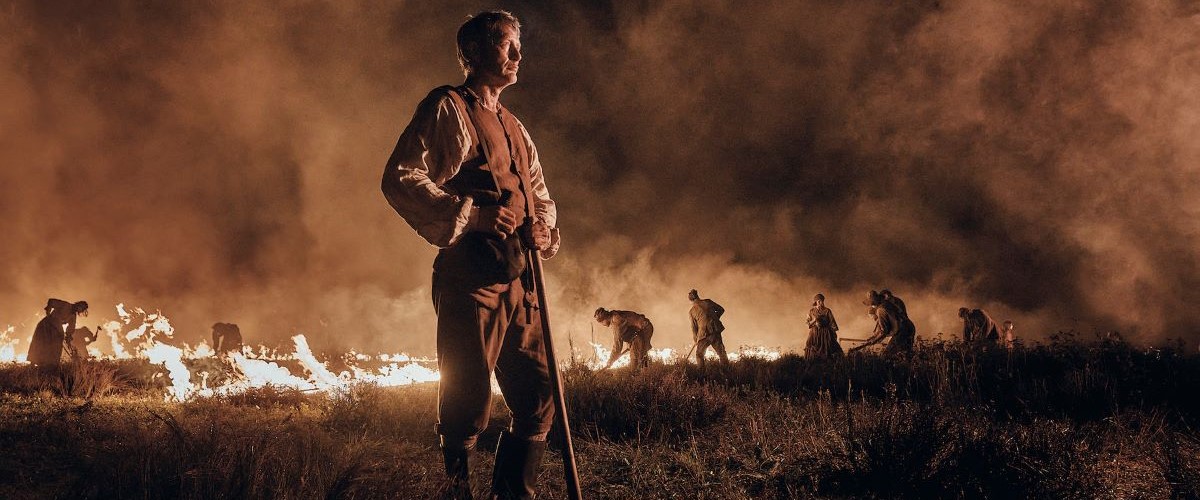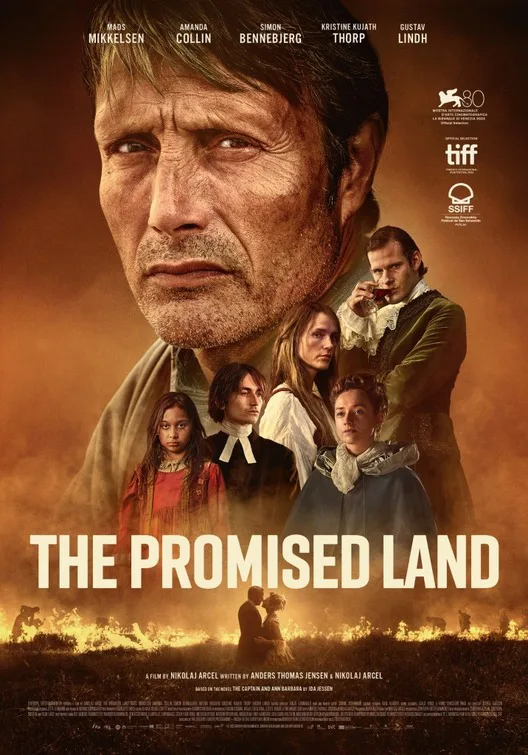“The Promised Land” is about ten movies in one. It’s a history lesson with a central figure driven by an impossible quest. There are bands of outlaws, sadistic aristocrats, and downtrodden peasants. There’s a little romance, a lot of torture, as well as a feisty runaway child. Historical epics like this really aren’t made anymore. There are so many different chapters of the central conflict it makes the final confrontation inevitable and therefore a little predictable. However, there’s still unexpected space, and the film takes its time, allowing for character development and emotional connection. It’s a wonder that “The Promised Land” works as well as it does.
Directed by Nikolaj Arcel, the film takes place in 18th century Denmark, when agricultural reforms cracked the rigid social hierarchies, where the rich lived in luxury and the “little people” were practically in a state of serfdom. Mads Mikkelsen, in his second collaboration with Arcel, plays Ludvig Kahlen, a man who hauled himself out of obscurity to become a Lieutenant in the Army. At the film’s opening, he is destitute, living in a poor house, and dreaming of developing a piece of land on the Jutland “heath”, a land deemed untameable. The Danish King is determined to settle the area. The royal court doesn’t want this and neither do the landowners, but the King grants Ludwig permission to settle a patch of land, promising him a noble title if he succeeds. Ludvig wants that title.
The heath soil is so tough Ludvig can barely dig a hole. A young pastor (Anton Eklund), supportive of the project, offers Ludvig help in the form of two runaway tenant farmers, husband Joannes (Morten Hee Andersen) and wife Ann Barbara (Amanda Collin). Ludvig takes them on with hesitation. People will be looking for them. It’s an uneasy situation. Meanwhile, the nearest nobleman, Frederik de Schinkel (Simon Bennebjerg), wants to run Ludvig off the land. Frederik, at first glance, seems silly and frivolous, but he is eventually revealed as a sadistic monster. He doesn’t even try to “play” Ludvig. It’s open warfare from the start. Ludvig also contends with roving bands of outlaws in the nearby forest. To top it off, a runaway child (Melina Hagberg) shows up on Ludvig’s doorstep and basically refuses to leave.
All of this is a highly fictionalized account of real events. Ludvig Kahlen was a real person, and the heath settlement with all its complications was a real event. Ida Jessen’s best-selling novel The Captain and Ann Barbara is the basis for the film adaptation, co-written by Anders Thomas Jensen and Arcel. There has clearly been a lot of fictionalization. It feels like this material could have been a bodice-ripping melodrama in less intuitive hands. But “The Promised Land” has control of its narrative. What’s most surprising is just how much character development is accomplished. Mikkelsen’s performance is a marvel, really. Haughty at first to Johannes and Ann Barbara, and downright mean to the child, Mikkelsen suggests depths which Ludvig attempts to conceal. What is this man’s pain? What is he looking for? Or running from? At times, tiny flickers of human emotion appear at the corners of his eyes, or his mouth, softening him. These moments carry more weight because Ludvig is normally so inexpressive. Amanda Collin is very strong as Ann Barbara, whose character development may be the most radical in the whole film.
Rasmus Videbæk’s cinematography captures the landscape in all its moods, lingering on the impenetrable fogs, the nights of howling wind, the glaring sun, the dark fairy tale forest filled with dangers. The interior of De Schinkel’s estate is lit by hundreds of candles at night, the effect reminiscent of Kubrick’s gorgeous “Barry Lyndon“. The costumes (Kicki Ilander) and production design (Jette Lehmann) are unobtrusive and feel extremely lived-in.
The conflict in “The Promised Land” is intense and Frederik is so despicable he borders on a cartoon villain. There’s a sameness in the escalating fight that gets repetitive after a while. What really holds interest in the film is Ludvig’s character development, and the characters of the makeshift family around him. I cared about these people. They seemed real. “The Promised Land” is so successful at what it attempts to do I felt exhilarated when the first fragile seedling popped up above the earth. It’s a reminder that a film needs to get the big things right—events and conflicts and obstacles—but it needs to get the small things right too. If a film gets the small things right, then a potato sprouting in the dirt will read like the miracle it is.




















